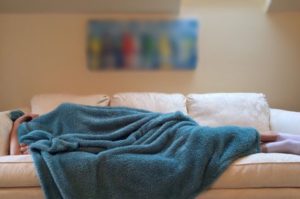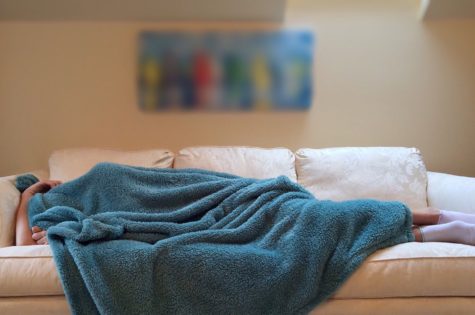BERKELEY, Calif. — Do you find you’re forgetting where you left your keys more and more frequently as you get older? Perhaps you’re just not getting enough deep sleep.
A new study finds that as people age and their ability to get truly restful sleep diminishes, their risk of memory loss and a wide range of mental and physical disorders increases.

Researchers at the University of California-Berkeley determined that the parts of the brain that deteriorate the fastest as we age are the same areas that are responsible for the deep, restorative sleep we enjoyed in our youth.
“Nearly every disease killing us in later life has a causal link to lack of sleep,” says senior author Matthew Walker, a professor of neuroscience and psychology at the school, in a news release.
Such ailments include heart disease, diabetes, and stroke, says Walker, while memory-related condition such as Alzheimer’s are more likely when it comes to lack of ample rest.
“We’ve done a good job of extending life span, but a poor job of extending our health span,” he adds. “We now see sleep, and improving sleep, as a new pathway for helping remedy that.”
During their review of the research, Walker and his team found that the elderly have more trouble generating the slow brainwaves that deep sleep requires, and their brains struggle to produce the neurochemicals responsible for switching from sleep to wakefulness.
In young, healthy brains, slow brainwaves help transfer memories and other information from the brain’s short-term memory center, the hippocampus, to the prefrontal cortex, where the brain stores long-term memories. These brainwaves become disrupted as we age.
The disruption of the brain’s production of the neurochemicals galanin, which promotes sleep, and orexin, which promotes wakefulness, often cause fatigue in older people during the day and restlessness at night.
The research team was quick to point out that sleeping pills don’t promote the kind of deep sleep that everyone needs.
“The American College of Physicians has acknowledged that sleeping pills should not be the first-line kneejerk response to sleep problems,” says Walker. “Sleeping pills sedate the brain, rather than help it sleep naturally. We must find better treatments for restoring healthy sleep in older adults, and that is now one of our dedicated research missions.”
Lead author Bryce Mander, a postdoctoral researcher in Walker’s lab, adds that just as important as the number of hours slept is the quality, or restfulness, of the sleep.
“Previously, the conversation has focused on how many hours you need to sleep,” he says. “However, you can sleep for a sufficient number of hours, but not obtain the right quality of sleep. We also need to appreciate the importance of sleep quality.”
So while many of us turn to supplements and holistic remedies to keep our brains and bodies young, perhaps deep sleep is the most natural — and effective — fountain of youth on the market.
The study’s findings were published in the journal Neuron.

Recent research show that this is not correct: ” healthy brains, slow brainwaves help transfer memories and other information from the brain’s short-term memory center, the hippocampus, to the prefrontal cortex, where the brain stores long-term memories.”
Long and short term memory are recorded at the same time.
Trust me, at least 8 hours per night when your older, make’s everything better
I read a paper about this the other day but I forgot what it said.
“Study finds” , that the people behind this study ARE A BUNCH OF IDIOTS. Doing something that your body was CLEARLY DESIGNED TO DO cannot extend your lifespan since to make that estimation we would need to be able to tell HOW LONG YOU WOULD HAVE LIVED OTHERWISE and that is something that eggheads obviously cannot do. People are fools and morons who put ANY credibility in such garbage!
considering your did a poor job of understanding and recapping the premise, your inability to understand may be due to a lack of deep sleep. You should get on that.
You seem angry. You should get some better sleep.
Hi Damien,
You have a point, you just get overexcited about it. What passes for medical science (and other sciences, from climate and economics to nutrition) these days is far too dominated by statistical studies that can identify ‘association’ of one thing with another, but forget that does not mean _causality_. People might not sleep as well when older as an accompanying _symptom_ rather than a _cause_.
In ‘the old days’ when medicine insisted on spotting (preferably proving) the mechanism (how exactly this actually would _cause_ the bad result, and what caused the cause) – medicine was more humble. In all fields, the ease of statistical analysis(download program, enter data, press ‘send’) has led scientists to scream ‘CAUSE’ or EUREKA when they have only really found ‘association’ (phenomena that tend to occur together – and it is still only ‘association’ if one always happens before the other until the mechanism is shown).
The key weakness in the article’s explanation is that they forget to ask WHY older people sleep less soundly? If we explore that, and keep tracing it deeper, we may someday get to what the real cause is, and maybe even be able to fix it.
At the rate science is falling into the convenience-trap of statistical analysis, that is going to take a long time.
Deep sleep! The article offers no clues how to get it.
Bourbon
After reading this I feel like taking a nap…and i will
I have sleep apnea, and it causes high blood pressure and all kinds of shit, I really need to get it figured out.
Yes why don’t you cut the food out fatso.
I am not fat troll
Respiratory stimulators like Echinacea & Thyme taken before bedtime might help keep you breathin’… way better than suffering the apnea-anoxia-adrenaline-surge-that-kickstarts-you-again routine.
I will try it! Thanks for the ideas.
Try sleeping on your side or stomach. MOST of the sleep apnea cases are the result of the jaw sliding into your throat while you are on your back.
I am not a doctor. I am relating experiences and info I have located on the web. Your mileage may vary.
Thanks for the ideas, I sleep on my side now and still stop breathing all night. I never really attempted to sleep on my stomach, Ill see if I can.
There are plenty of hypnosis video’s on youtube that will do the trick.
I can vouch for this, I tried it last week, had the best night of sleep in months.
Try the Gibson Research sleep formula. The ingredients are all over the counter and an initial supply is about $30. It works for me, YMMV.
https://www.grc.com/health/sleep/healthy_sleep_formula.htm
Good sleep? What has worked for me…
1. LOSE WEIGHT, an atkins style diet, eating organics, helps you lose the weight and more importantly chronic inflammation of your body that leads to sleep apnea, which prevents good deep sleep — this is a very bad self feeding mechanism that needs to be interrupted, and only organic wholesome food will fix it.
the rest is secondary, but acts as a multiplier, adding up:
– no caffeine after lunch – or even half caf in the AM, if that is still not enough
– no likker after lunch
– get an app on your computer/phone/tablet, that changes the screen color to have fewer blues after sunset.
– make sure you are up on your vitamins and minerals, to me iodine is vital, as it feeds most of the body’s hormones. Magnesium also promotes relaxation and rest.
– a quiet, dark space with a comfortable bed
– as someone noted, those relaxation hypnosis videos on youtube and elsewhere work really well
– regular sleep hours
– breathe, relax before sleep
– a bath cannot hurt
– walk, a lot, intermittently, get some fresh air, focus your eyes on nature
I have only one humble talent. I can sleep. If I am warm, especially my feet , it is easy for me to sleep. I do tend to eat before I sleep but I still sleep if I have not eaten. I can sleep well on one cup of coffee. Now I have learned another benefit of my one talent…..retention of memory with aging. I will take it.
Of all the “studies” about improving health, I believe THIS ONE IMPLICITLY
This just in…sleep is good for you.
In other news: water is wet!
So then, what do I do to get more “deep sleep”????
“Nearly every disease killing us in later life has a causal link to lack of sleep”
Can’t be a very good ‘scientist’ if he thinks correlation does imply causation